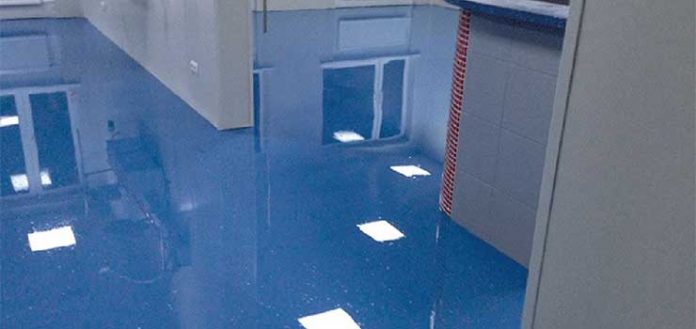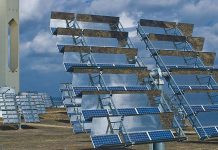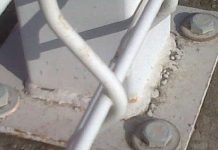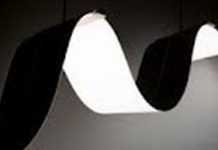
In industry in general and, specifically in some sectors such as food, among others, epoxy resin flooring is being incorporated more and more.
The reason is its many qualities, which makes it very suitable for this type of application.
Therefore, today we will talk about epoxy resin flooring. What are they like, what qualities do they have, as well as their uses and applications.
Elastic flooring.
What is epoxy resin flooring?
We will start by looking at what exactly it is. A few years ago, we published the article “All about Epoxy or polyepoxide resins” which dealt with epoxy resin, but from a very general point of view. Today we wanted to delve into this same material, but focusing exclusively on pavements and floors.
It is a self-leveling floor, made of a thermosetting polymer, which hardens when mixed with a catalyzing agent.
Some of its main virtues are its high durability, its impermeability, as well as its resistance to abrasion.
It is easy to apply and has a clean, continuous and smooth finish. And its thickness is very low, so it adds little weight or thickness when placed on the existing pavement.
Epoxy resin flooring consists of three parts:
- the substrate. Existing pavement or concrete floor.
- The primer, which must be suitable for the existing support, that is, the substrate.
- And the self-leveling epoxy resin.
Stages of the installation process of an epoxy pavement.
Generalities
It is highly resistant to extreme temperatures. In cases of occasional exposure, it reaches 70º C. And in prolonged exposures it reaches 45º C.
On the other hand, it presents a great electrical resistance, as well as to chemical processes.
The application of epoxy resins for continuous flooring for industrial use is done “in situ” and is quite quick and easy to carry out.
The drying time of epoxy resins is somewhat longer than that of other materials, being around eight hours at a temperature of approximately 20º C.
It should also be borne in mind that, during its application, it does not give off odours.
On the other hand, it is a material that once it sets, the contraction it experiences is minimal.
Finally, indicate that it supports many textures, colors and designs, thus achieving endless possible finishes.
High gloss self-leveling flooring.
Qualities and characteristics of resin flooring
Below we will relate some of the qualities and characteristics of this type of flooring.
- It has an excellent response against shock and vibration absorption.
- Reduces the risk of injury, against accidental falls.
- It provides a great feeling of comfort when walking on it.
- It is highly resistant. The elastic materials that make it up make it possible for it to withstand high workloads, as well as absorb shocks.
- It is fire retardant. This type of flooring is ideal for preventing the spread of fires. This is due to its composition: resins and abrasion-resistant particles.
- They are moisture resistant. Therefore, they are suitable for both indoors and outdoors.
- Non-slip, so they are ideal for outdoors, or for industries that work in humid environments.
- Very resistant to continuous use, having a long useful life.
- They are quite aesthetic. The final result of this type of flooring is very showy and attractive.
- Epoxy resin floors are continuous floors, regardless of the surface to be covered, and therefore, they do not have joints. Which favors easy maintenance and cleaning.
Low Cost flooring.
Epoxy Resin Applications
Epoxy resin floors, being elastic, have a wide field of application. The most widespread is in industry, however, it is also suitable for hospitals, gyms, schools, etc.
As we pointed out before, one of the main applications is the food industry, where it is considered the optimal flooring for several reasons: The main reason is that it meets all the requirements in terms of safety and hygiene. But do not forget that this type of floor is comfortable, cheap and easy to install, maintain and clean.
It is even beginning to spread to the domestic sphere, being one of the most attractive alternatives when it comes to renovating a floor. They are ideal, especially because costly works are avoided, in which the removal of the existing pavement is what makes them more expensive. Not to mention everything that goes into a construction site with rubble.
It can also be used to unify elements at different levels. For example, it is valid to cover an existing staircase, both the tread and the riser, achieving a continuous effect.
On the other hand, epoxy resin is widely used to cover all types of transformers, motors, generators, and other electrical and electronic elements, thanks to its great electrical resistance.
Advice for its execution
When installing this type of flooring, it is important to take into account some factors.
The Forged
It must be taken into account that the average drying time of the epoxy resin is about 8 hours at a temperature of about 20º C.
The amounts
Although the average thickness of this type of flooring is about 3 mm, depending on the type of substrate, and each particular situation, the amount of epoxy resin could vary. Therefore, it would be advisable to resort to evaluation and advice by a professional.



